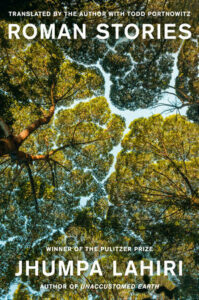Most translators of contemporary literature have at some point worked with an author who knows some English. And if an author knows some English, they’ll likely want to take a glance at what you’ve done with their prose. On occasion this can be helpful, when they save you from a mistranslated idiom, say, or clear up a particularly knotty passage; but most of the time, at least in my case, I find it to be a pain in the ass. Or maybe I’m just jaded by a couple bad experiences, when an author, overestimating their knowledge of English, started picking apart my sentences and bending them back toward the original Italian, rendering the text perhaps more literal but less faithful in tone and meaning. What happens, then, when the author reviewing your translation not only speaks English fluently but has already written a Pulitzer Prize-winning collection of stories in the language?
Jhumpa Lahiri, as is well known by now, has been writing and publishing much of her work in Italian since 2015’s In altre parole, translated into English, under the title In Other Words, by Ann Goldstein. With her latest novel, 2018’s Dove mi trovo, published in English three years later as Whereabouts, Jhumpa did the translating herself, and it’s safe to say—based solely on the number of people who have asked me “Why didn’t Jhumpa translate the stories herself?”—that everyone assumed she’d go on doing just that. Why she didn’t is a question for her, not me, alas, and she does address it in an interview with Cressida Leyshon that accompanied the New Yorker’s publication of “P’s Parties,” one of the three (of nine) stories in Roman Stories that I translated.
So yes, there are nine stories in Roman Stories, six of which Jhumpa did the first pass translation of and three of which I took the first crack at: “P’s Parties,” “Well-Lit House,” and “Notes.” When each of us had completed our drafts, we swapped stories, marked them up, and passed them back for a final look. I wish I could tell you that we spent long hours on the phone debating the nuances of one crucial word, or that we cursed and moaned and took one another’s suggestions through gritted teeth, or that epiphanies shot off like embers from the hearth of our melded minds, but mostly we agreed, grateful to have another pair of eyes on our work.
To read Jhumpa Lahiri in translation, they think—even a translation she’s involved in producing—is to get less of her.
Though this arrangement adds some pressure for the translator on the front end—I naturally felt a little more anxious than usual to deliver pages that were as clean and convincing as possible—it takes the pressure off in the later stages, when it’s time to set the words in stone. Those final decisions I could leave to a person not only perfectly capable of making them but who possesses the very voice I was aiming to capture. How could she be wrong?
Any yet, on the publication of “P’s Parties” in the New Yorker, you could still find people tweeting about how the prose style felt unlike her in some way, or even that her books written in English are for English-language readers and those written in Italian for Italian readers, as if there should be a partition. Alarmingly, what these readers are expressing here is not so uncommon: the fear of indirect contact. They can’t bear to think that their beloved author has passed through the filter of some other being. To read Jhumpa Lahiri in translation, they think—even a translation she’s involved in producing—is to get less of her. It’s part of the reason readers in the U.S. don’t like translation much in the first place—we distrust anything but direct contact and assume the middleman will cheat us in some way. If we’re not getting the real thing, why get it at all? And it’s why we often don’t credit or forget to credit translators, because when we do have a Great Literary Experience, like reading Rilke’s Duino Elegies as an undergrad, for example, it doesn’t even cross our mind that some second party—some guy named Stephen Mitchell—could have put us under such a spell. We resent that there’s an interpretive element to translation. And it’s the same resentment that lay at the root of my bad experiences with those Italian authors, who tried to superimpose my English onto their Italian—to make it more of a tracing than a drawing. But you can’t trace one language with another.
So what did this all mean when it was my turn to review Jhumpa’s translations? What could I possibly do? Even if her English veered from the original Italian, isn’t it her right to veer? How would I be able to tell the difference between a mistake and a willful departure? Aware of this dilemma, and of Jhumpa’s preference to stay true to the Italian, I took a maximalist approach, over-correcting and suggesting any solutions that seemed felicitous—always based on the original text—so that Jhumpa could consider all options and take or discard the changes as she saw fit. The result would be a text that combines the craft of two different translators, with their unique relationships to the English and Italian languages, and two different approaches to problem solving, into one fluent and unified manuscript. I hope that’s the case, for anyone who picks up Roman Stories—and I hope it feels like the real thing.
__________________________________

Roman Stories by Jhumpa Lahiri, translated by Jhumpa Lahiri and Todd Portnowitz, is available from Alfred A. Knopf, an imprint of Knopf Doubleday Publishing Group, a division of Penguin Random House, LLC.
